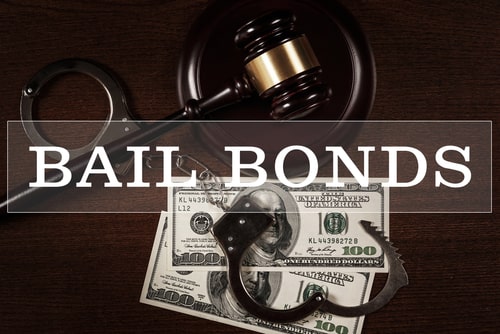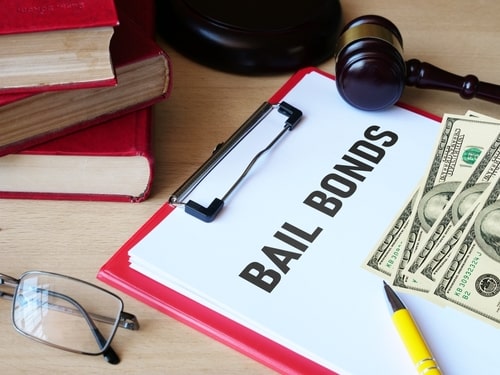Recent Blog Posts
How Bail is Different For Felonies and Misdemeanors
 Making bail after a typical misdemeanor offense, like a drunk driving charge or a simple assault, is usually a very quick and easy process. Bond is usually set low when the charges are not very serious. Bonding out of jail after being charged with a felony can be harder. Most people who are charged with a felony need the help of a licensed bail bondsman to get out of jail on pretrial release. Felonies are serious criminal charges, so there is more risk involved in releasing someone who is charged with one. If you need help getting out on bond, a licensed Dallas, TX bail bondsman can help.
Making bail after a typical misdemeanor offense, like a drunk driving charge or a simple assault, is usually a very quick and easy process. Bond is usually set low when the charges are not very serious. Bonding out of jail after being charged with a felony can be harder. Most people who are charged with a felony need the help of a licensed bail bondsman to get out of jail on pretrial release. Felonies are serious criminal charges, so there is more risk involved in releasing someone who is charged with one. If you need help getting out on bond, a licensed Dallas, TX bail bondsman can help.
People Facing Felony Charges Are a Flight Risk
People facing misdemeanor charges are considered less of a flight risk. Few people are willing to spend the rest of their lives trying to avoid all contact with the police while risking additional, far more serious, charges to get out of a minor offense that may not lead to any jail time. However, people facing serious charges that carry years in prison are more likely to take the risk of fleeing.
What to Consider Before Helping a Friend Make Bail
 Abruptly getting a call from a recorded voice stating that an inmate at the local jail would like to speak to you can be alarming, especially if it comes in late at night. Even if you suspect that you already know exactly who would be calling you from jail, curiosity might compel you to answer. On the other end of the line is a friend - he got into a bar fight, was pulled over for driving drunk, or was caught with drugs. He needs you to help him bail out, preferably before his boss notices his absence. If possible, you should try to connect your friend with a licensed Dallas, TX bail bondsman. A bondsman is in the best position to assist your friend and to determine what risks might be associated with posting bail.
Abruptly getting a call from a recorded voice stating that an inmate at the local jail would like to speak to you can be alarming, especially if it comes in late at night. Even if you suspect that you already know exactly who would be calling you from jail, curiosity might compel you to answer. On the other end of the line is a friend - he got into a bar fight, was pulled over for driving drunk, or was caught with drugs. He needs you to help him bail out, preferably before his boss notices his absence. If possible, you should try to connect your friend with a licensed Dallas, TX bail bondsman. A bondsman is in the best position to assist your friend and to determine what risks might be associated with posting bail.
Offer Collateral or Payments With Caution
If some type of collateral is required, you should think very carefully before offering property of your own. Many bondsmen can work directly with the incarcerated person so that any required collateral or upfront payment comes directly from him. If your friend fails to appear in court for any reason, you could lose any money or property you have offered. You know your friend better than the judge assigned to his case and are probably in a better position to guess whether your friend is a flight risk. If you have a feeling that your friend would leave town or refuse to address his charges, make sure you are not taking on any financial risk. A bondsman may not accept his case if this turn of events seems likely.
Can I Post Bail From Out of State?
 When you hear that your loved one has been arrested in Texas while you are living in another state, you might feel helpless, like there is nothing you can do to help. It is not as if you can drive right to the jail and post your friend or family member’s bond within an hour. Fortunately, you can bail your loved one out from out of state with the help of a licensed McKinney, TX bail bondsman. The bond process may be slightly more complicated, but you will not need to make a special trip out to Texas to help your loved one get out of jail while awaiting trial.
When you hear that your loved one has been arrested in Texas while you are living in another state, you might feel helpless, like there is nothing you can do to help. It is not as if you can drive right to the jail and post your friend or family member’s bond within an hour. Fortunately, you can bail your loved one out from out of state with the help of a licensed McKinney, TX bail bondsman. The bond process may be slightly more complicated, but you will not need to make a special trip out to Texas to help your loved one get out of jail while awaiting trial.
How Soon Can I Help My Loved One Get Out of Jail?
Jails can be rather unpleasant - and unsafe - places. You likely want to get your loved one out as quickly as possible. After your loved one’s arrest, he will likely need to wait until he can appear before a judge. If your loved one was not conveniently arrested on a weekday morning, this will likely happen the next day, or on Monday if the arrest took place over the weekend. Bail is normally set at this first hearing.
When Is a Defendant Considered a Flight Risk?
 In our last blog, we stated that one of the reasons a bail bondsman might refuse to work with a particular defendant is because the defendant is at risk of fleeing rather than returning to court. When a defendant fails to appear in court again after bail is posted by a bondsman, the bondsman must go through the process of seizing any collateral offered or tracking down the defendant and forcing him to respond to his charges. Most defendants are not considered flight risks and are able to make bail, often with the help of a bondsman. However, there are a few factors that might suggest a particular defendant is likely to flee after bonding out. A Dallas, TX bail bonds professional can help you understand why you or the arrestee you are helping may or may not be considered a flight risk.
In our last blog, we stated that one of the reasons a bail bondsman might refuse to work with a particular defendant is because the defendant is at risk of fleeing rather than returning to court. When a defendant fails to appear in court again after bail is posted by a bondsman, the bondsman must go through the process of seizing any collateral offered or tracking down the defendant and forcing him to respond to his charges. Most defendants are not considered flight risks and are able to make bail, often with the help of a bondsman. However, there are a few factors that might suggest a particular defendant is likely to flee after bonding out. A Dallas, TX bail bonds professional can help you understand why you or the arrestee you are helping may or may not be considered a flight risk.
Having Strong Ties to the Area Reduces Flight Risk
People with strong ties to the Dallas area are less likely to flee. If you have been at the same job for years and own a home, or if you have a spouse and children or an elderly parent who you are responsible for supporting or providing care for, your risk of fleeing would be very low. The same may be said if you have lived in the area for almost all of your life and have no strong ties to any other location.
Can a Bail Bondsman Turn Someone Away?
 When someone is arrested, securing a bail bond is often a critical step for release from jail. However, many people are surprised to learn that bail bond professionals have the right to refuse service. A Texas bail bond professional can help you understand the circumstances under which an agent might turn someone away and what options are available if this happens.
When someone is arrested, securing a bail bond is often a critical step for release from jail. However, many people are surprised to learn that bail bond professionals have the right to refuse service. A Texas bail bond professional can help you understand the circumstances under which an agent might turn someone away and what options are available if this happens.
Reasons for Refusal
Some agents simply avoid certain high-risk offenses. Additionally, bail bondsmen have the right to decline service for several other reasons, including if the defendant:
-
Is likely to flee
-
Has insufficient collateral
-
Provides incomplete or false information
-
Has past payment problems or court appearances
The Bail Bond Process
Understanding how bail bonds work can help defendants avoid potential refusals and know their rights:
What Is an Indemnity Agreement?
 Indemnity agreements play a major role in many legal and business transactions. You may have encountered this term if you have ever signed a contract. A Texas bail bond professional can help you understand indemnity agreements, how they work, and why they matter to you.
Indemnity agreements play a major role in many legal and business transactions. You may have encountered this term if you have ever signed a contract. A Texas bail bond professional can help you understand indemnity agreements, how they work, and why they matter to you.
What an Indemnity Agreement is Used For
An indemnity agreement is a legal contract where one party agrees to compensate another party for potential losses or damages. In simpler terms, it promises to protect someone from financial harm.
The party providing the protection is called the "indemnitor," while the party receiving the protection is the "indemnitee." For example, a defendant or their family member (the indemnitor) might sign an indemnity agreement with a bail bondsman (the indemnitee) in a bail bond situation. This agreement protects the bondsman from financial loss if the defendant fails to appear in court. The indemnitor agrees to reimburse the bondsman for any costs incurred in such a situation, including the full amount of the bond.
After an Arrest, When Do You Contact a Bail Bondsman?
 The moments following an arrest are often filled with confusion, anxiety, and a sense of urgency. As the reality sets in, one popular question is, "How can you protect your loved one’s release from jail?" This is where a Texas bail bond professional becomes helpful. However, knowing the right time to reach out to a bail bondsman can significantly impact the speed and efficiency of the release process.
The moments following an arrest are often filled with confusion, anxiety, and a sense of urgency. As the reality sets in, one popular question is, "How can you protect your loved one’s release from jail?" This is where a Texas bail bond professional becomes helpful. However, knowing the right time to reach out to a bail bondsman can significantly impact the speed and efficiency of the release process.
First, You Should Understand the Arrest and Booking Process
When law enforcement takes an individual into custody, he or she is first transported to a local jail or holding facility. Here, the individual undergoes the booking process, which involves recording personal information, taking fingerprints and photographs, and conducting a background check.
Following the booking, the arrestee will have an initial hearing where a judge determines if there is probable cause for the arrest and sets the bail amount. The duration of this entire process can vary significantly depending on the jurisdiction and the specific circumstances of the arrest. In some cases, it may take only a few hours, while in others, it could extend to a day or more.
What Types of Bail Bonds Are Available in Texas?
 When someone is arrested in Texas, securing release from jail often involves bail bonds. Understanding the various types of bail bonds available can help defendants and their families find their way through the legal system more effectively. A Texas bail bond professional can help you understand the options and provide essential information for those facing arrest or assisting a loved one.
When someone is arrested in Texas, securing release from jail often involves bail bonds. Understanding the various types of bail bonds available can help defendants and their families find their way through the legal system more effectively. A Texas bail bond professional can help you understand the options and provide essential information for those facing arrest or assisting a loved one.
Types of Bail Bonds in Texas
Cash Bonds
- Requires full payment of the bail amount to the court
- Refundable upon case conclusion, minus any fees or fines
- Ideal for those with available funds
Surety Bonds
- Obtained through a bail bond agent
- Typically require 10% of the total bail amount as a non-refundable fee
- The bail bond company guarantees the full amount to the court
Personal Recognizance (PR) Bonds
Cash Bond Vs. Surety Bond in Texas
 Understanding the different types of bonds available can be crucial when facing arrest in Texas. Two common options are cash bonds and surety bonds. Each has advantages and considerations, and knowing the differences can help you make an informed decision during a stressful time. A bail bond professional can help determine which option will be more favorable for you.
Understanding the different types of bonds available can be crucial when facing arrest in Texas. Two common options are cash bonds and surety bonds. Each has advantages and considerations, and knowing the differences can help you make an informed decision during a stressful time. A bail bond professional can help determine which option will be more favorable for you.
What is a Cash Bond?
A cash bond, as the name suggests, involves paying the full bail amount in cash directly to the court. Here are key points to understand about cash bonds in Texas:
- Full Payment: The entire bail amount must be paid upfront.
- Refundable: Upon the conclusion of the case and meeting all court requirements, the full amount is typically refunded minus any fees or fines.
- No Third-Party Involvement: There is no need for a bail bondsman.
What is Bail Bond Forfeiture?
 In the state of Texas, bail bond forfeiture is a serious matter that can have significant consequences for both the defendant and the bail bond company. When arrested and charged with a crime, the person in question may be released on bail pending his trial. The purpose of bail is to ensure the defendant's appearance in court as required. The bail bond may be forfeited if the defendant fails to attend his scheduled court appearance. A Texas bail bond professional can help explain what may happen if you forfeit your bond.
In the state of Texas, bail bond forfeiture is a serious matter that can have significant consequences for both the defendant and the bail bond company. When arrested and charged with a crime, the person in question may be released on bail pending his trial. The purpose of bail is to ensure the defendant's appearance in court as required. The bail bond may be forfeited if the defendant fails to attend his scheduled court appearance. A Texas bail bond professional can help explain what may happen if you forfeit your bond.
The Bail Bond Process
When a defendant is granted bail, he has two options: pay the entire amount or secure a bail bond through a licensed bail bond company. Most defendants choose the latter option, as it typically requires paying only a percentage of the bail amount (usually 10-15%) as a non-refundable fee to the bail bond company.
The court receives a surety bond from the bail bond company to ensure the person's presence on all court dates. If the defendant complies with the terms of his release and attends all required court appearances, the bond is dissolved at the conclusion of the case.










